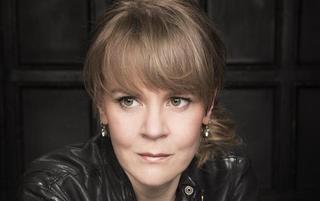|
Back
Mystical Music New York
Avery Fisher Hall, Lincoln Center
05/21/2015 - & May 22, 23, 2015
Johannes Brahms: Variations on a Theme by Haydn Opus 56a – Piano Concerto Number 1 in D Minor, Opus 15
Jonathan Harvey: Tranquil Abiding
Kirill Gerstein (Pianist)
New York Philharmonic Orchestra, Susanna Mälkki (Conductor)

S. Mälkki
(© www.Harrisonparrott.com)
A colleague once cautioned me that no serious critic pays attention to the physical movements of the conductor. Only the musical results are of import. Still, I’ll have to break his admonishment, because Susanna Mälkki looked so fantastic up on the podium last night.
Ramrod-straight, she started off the Brahms Haydn Variations like a military bandleader. As the variations continued in complexity, her excitement was equally complex, though never uncontrolled, for her discipline is unquestioned. Perhaps one could imagine the father of Charles Ives (himself a noted bandleader), possessed with the eccentric emotions of his son, leading the village tootlers and drummers into marches and dancing tunes that exceeded their original purpose and became something more glorious.
She was terrific to watch in this Brahms opener, and in fact, she took what could have been that stately, clever somewhat academic set of variations into regions rarely heard before. She lengthened the fourth Andante into romantic territory, she gave a colorful lilt to the sixth variation, and was more than adept in bringing out that nostalgia in the last two sections. (How deep the whole thing would have been if Brahms hadn’t added those de rigueur bravura measures.)
Toward the end, it wasn’t quite clear whether the NY Phil was following Ms. Mälkki’s tempo to the nth degree, but she was still effective.
The second work was most important to myself, and several others in the audience (and may have been while Avery Fisher Hall wasn’t packed). While every composer, by definition, is mystical, pulling magic out of an aether, very few claim that their mystical tendencies guide their principles. Jonathan Harvey, who died tragically two years ago, is one whose Buddhist beliefs shaped all his later works.
He had studied with and wrote a book about Stockhausen, worked with Pierre Boulez and was an ardent student of the most progressive tendencies of the so-called Second Viennese School. But the music I have heard in New York–Bhakti, Death of Light/Light of Death and above all, Bird Symphony with Plainsong–transcend any school or pattern. Like the Russian Orthodox John Taverner or like the later works of Scriabin, Jonathan Harvey took his ideas innately and inherently, from a belief above mankind.
This piece, Tranquil Abiding, takes its motifs from the slow inhale/exhale of Yogic meditation. In fact the two lumbering yet soothing downward notes from the low strings continues throughout the 14 minutes. It is a pulse which rarely changes pace, though above it, Mr. Harvey has assembled a gorgeous panoply of winds, brass, strings and the soft Buddhist sounds of bowls and bells, woodblocks and bamboo clusters.
Some might have felt the music as a vehicle for reveries, I felt those two unceasing slow notes as doors to a spiritual wonderland,. I don’t have the keys yet, but evidently Mr. Harvey did, producing another entrancing work.

K. Gerstein (© www.kirillgerstein.com)
The finale was more Brahms, and once again we saw that Kirill Gerstein can play absolutely anything. Faultlessly, with energy, with seeming ease and with volcanic power. I was not totally taken in by this performance of the First Concerto. At first, because the orchestra, after a fine introduction, was all too quickly sublimated to little quacks and squeaks commenting on Mr. Gerstein’s playing. He gave absolutely everything to the piano, but one had the thought that the orchestra wasn’t altogether en point with the hands.
Yes, that slow movement was suitably tender, but once Mr. Gerstein exploded with the finale–eschewing the ma non troppo command as if it was a typographical error–he simply sprinted towards the end, with a terrific cadenza.
I was of two minds at the end. First, Mr. Gerstein is a fabulous jazz musician, and I wouldn’t have minded a Gershwin encore. Most important, fluffy jazz doesn’t go with fervent Brahms. Wisely, he played no encore. For whatever the minor problems, it was still a cogent performance, and Mr. Gerstein never fails to achieve his weighty calculations.
Harry Rolnick
|